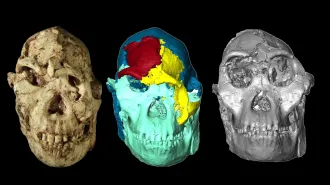Letters from the April 8, 2006, issue of Science News
Hot and cold
“Warming climate will slow ocean circulation” (SN: 2/4/06, p. 77) makes me wonder, Does continental drift cause occasional changes to the ocean’s currents? Would major reorganizations of ocean currents tend to cause ice ages by temporarily disrupting the flow of warm water that normally keeps the ice at bay? Would simulations of past continental positions indicate when reorganizations would have occurred?
Matt Henry
Whittier, Calif.
Computer simulations suggest that continental drift can indeed affect ocean circulation. Analyses suggest that as a result of changes in ocean circulation, the present-day climate of the North Atlantic Ocean is significantly warmer and that the Southern Hemisphere is generally cooler than they were before North and South America were joined by the Isthmus of Panama about 3 million years ago.—S. Perkins
Remember your vitamins
Trying to explain why “Diabetes most often begins in March” (SN: 2/4/06, p. 77), researchers speculate about “cold weather, inactivity, and overeating.” Did they consider the possible role of a seasonal deficiency of vitamin D?
Joseph Dewhirst
Sharon, Mass.
Vitamin D would logically be at its most depleted level in the body in March and at its most concentrated level in the body in August, due to people’s sun exposure. It would be interesting to find out if cases of diabetes are less likely as people move nearer the equator. In general, the extent to which vitamin D has been ignored as an inhibitor of human diseases is astounding.
David E. Mosteller
Shreveport, La.
The study, which focused on type 2 diabetes, didn’t examine vitamin D. Studies have shown that type 1 diabetes is less common near the equator than near the poles.—B. Harder







